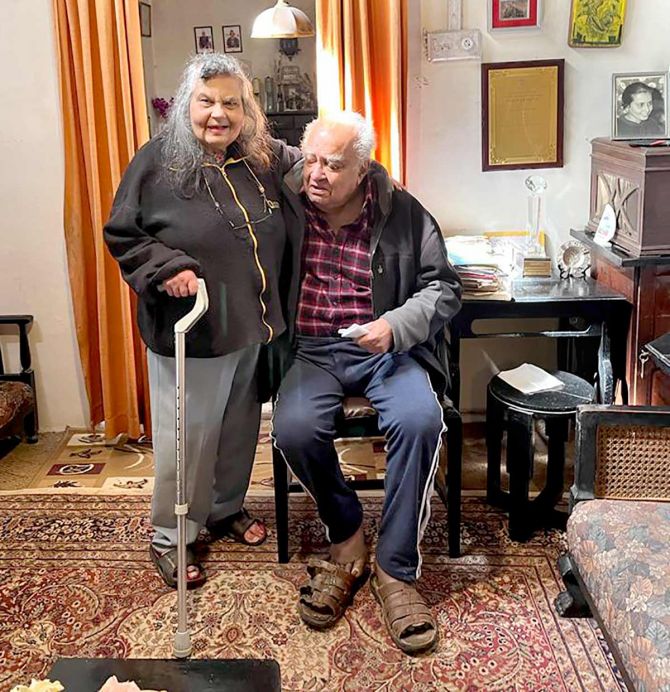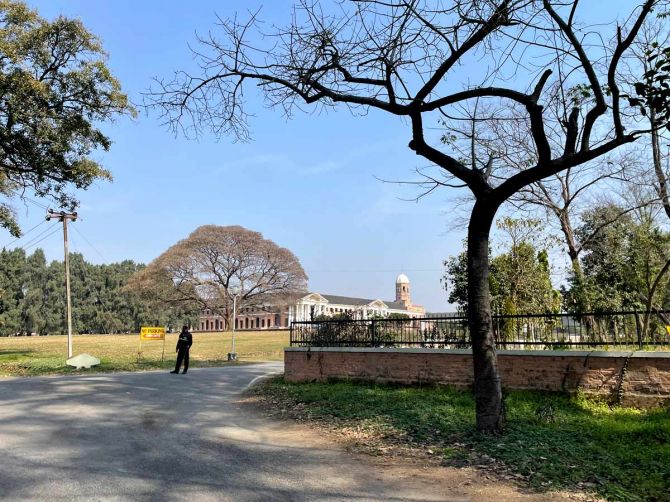'And Joshimath has already shown the dangers ahead.'
'We have to acknowledge that our mountains are still young babies.'
'You don't put an extra load on the back of a growing child!'
Colleen and Hugh Gantzer's travel writings showed India to Indians and the world. The couple was the first to start writing regular travel features in newspapers and magazines in the mid-1970s.
Their fine writings are an education -- if you haven't read them, it will be worth your while to look for them and read them.
The Gantzers' love for travel was boosted after Commander Hugh Gantzer's posting in Kerala as a naval officer. One of their early journeys was on a Vespa scooter along with their little son from Cochin to Kanyakumari.
After retirement, they travelled to every part of India and were invited by state tourism boards to write about places of tourist interest. They wrote thousands of articles and a dozen books, had memorable encounters and brought in untold stories from places far and near.
Commander Gantzer is 91; Mrs Gantzer, 88 -- the couple do not travel any more, but continue to contribute articles. The writing table is stacked with notebooks and books.

Their nearly 180-year-old cottage is an ode to memories of their travel -- the dining room wall is covered with plates from different countries, including one bearing the image of the first vampire, Vlad Dracula, the king of Romania.
The Gantzers brought back something from every place they visited. A glass showcase is packed with such treasures; flowers are arranged in an ornate incense burner from Myanmar on the centre table in the drawing room, while a small brass rice cooking vessel from Kerala sits beside a small statute made by tribals in Bihar.
Over tea and hot pakodas, Commander Hugh and Mrs Colleen Gantzer generously shared their travel memories with Rediff.com's Archana Masih in the concluding part of a must-read interview.
- Part 1: They Showed India To The World
What is tourism according to you?
Tourism is history, religion, culture. Every fifth human has the travel gene which forces people to travel, to look, to go far. This is a biological fact. Human beings are the only species that cover the whole planet.
There is no limit to travel.
Travel is the business of transportation; transportation is the business of the movement of living things and tourism is the business of the movement of human beings in pursuit of fantasy.
Why does anyone want to go anywhere else? To see what is there and that's what has taken the human race across the world.

What are the states in the Indian Union where the tourism potential has been under used?
We discovered that Bihar had the highest potential for tourism in all the states of India, but it was the least developed.
I think Gujarat has a lot more to offer. The state also has a race of people who arrived even before the Aryans. They established the first dry dock, the first Indian manufacturing industry, which used to export to Mesopotamia, the first major civilisation between Europe and Asia.
Gujarat has now realised its rich heritage and has started promoting Dholavira, Lothal etc.
What are the top reasons for Bihar having the most travel potential in India?
Bihar has everything. The origins of Indic culture which includes the spectrum of Hinduism, Buddhism, Jainism, Christianity, Sikhism -- all have roots in Bihar.
Christianity made one of its first establishments after Kerala in Bihar. Mother Teresa came to Patna for a few months to learn nursing at a hospital before she started serving the poor. A Missionaries of Charity centre was started in the same hospital.
Islam also has many important places in Bihar.
Why has it been unable to exploit it, say like Kerala or Rajasthan?
Tourism cannot be developed unless it is centered around an international language. Hindi is not an international language; English is -- and the Rajasthanis, Madhya Pradeshis and Gujaratis have learnt that, but Bihar unfortunately has not.
Bihar got its name from 'Vihara' [Buddhist monastery]. The first Buddhist university was established in Nalanda. The Dalai Lama says that Buddhism has its roots in Nalanda University.
Bihar was the cultural centre of India, but what has it done to promote it?

What is a day in your life like nowadays since you do not travel anymore? What keeps you busy?
We spend all our time at home within our garden and a small patch of woodland.
We write a column for a local paper because we believe every person has to pay back to society.
We write about the local problems and the Garhwal Post gives us freedom to write what we like.
We also write occasionally for The Indian Express, Tribune. We write when we feel there is something important to talk about -- our latest idea is that Dehradun should host the World Ecological Forum just like Davos hosts the World Economic Forum.
The big problem today is not economics, it is ecological -- the relationship between mankind and environment.
Economics is the activity of greed. Like Mahatma Gandhi said there's enough for everyone's need, but not enough for everyone's greed.
We are producing far too much carbon dioxide which is resulting in a change of climate.
The biggest glacier in the South Pole is melting; if it melts down totally, it will destroy large swathes of humanity.
Dehradun is the right venue for an ecological forum because of the Himalayas. Its glaciers produce the greatest and most worshipped rivers on the globe, the Ganga and Yamuna and the Saraswati.

The cracks in Joshimath and Badrinath early this year have yet again revealed how we are failing in protecting the fragility of the Himalayas.
Joshimath was a man-made disaster. A report in 1976 had stated that the town stood on unstable ground, but no government acted upon it and construction continued unabated.
It was akin to standing on an unstable stool and putting a noose around your neck?
You have lived in Mussoorie for decades. What do like best about your town?
My parents moved up here from Bihar. I have seen the town grow and deteriorate. I am a member of the Supreme Court Monitoring Committee for Dehradun and Mussoorie.
A study on the carrying capacity of the town had concluded that there was no more room for any more construction, yet the town has been overbuilt because of the sheer greed of the people.
The Himalayas are the youngest mountains in the world and are rising at the rate at which our fingernails grow. We have overloaded these unstable mountains and Joshimath has already shown the dangers ahead.
We have to acknowledge that our mountains are still young babies. You don't put an extra load on the back of a growing child! That's cruelty and that is what's being done by short sighted politicians.
We're not talking any particular political party, but politicians as a group.
What keeps us in Mussoorie is the fact that this is the best home we've known. It's our home.










